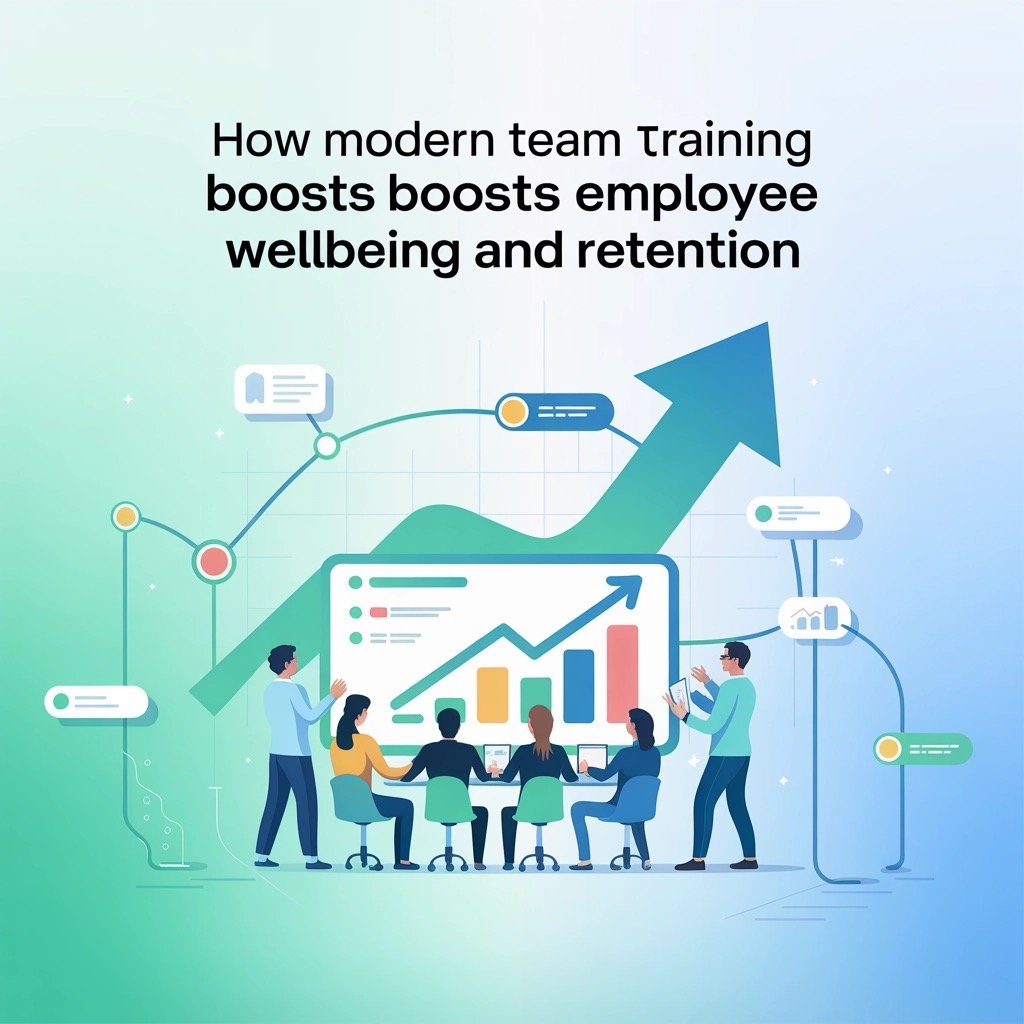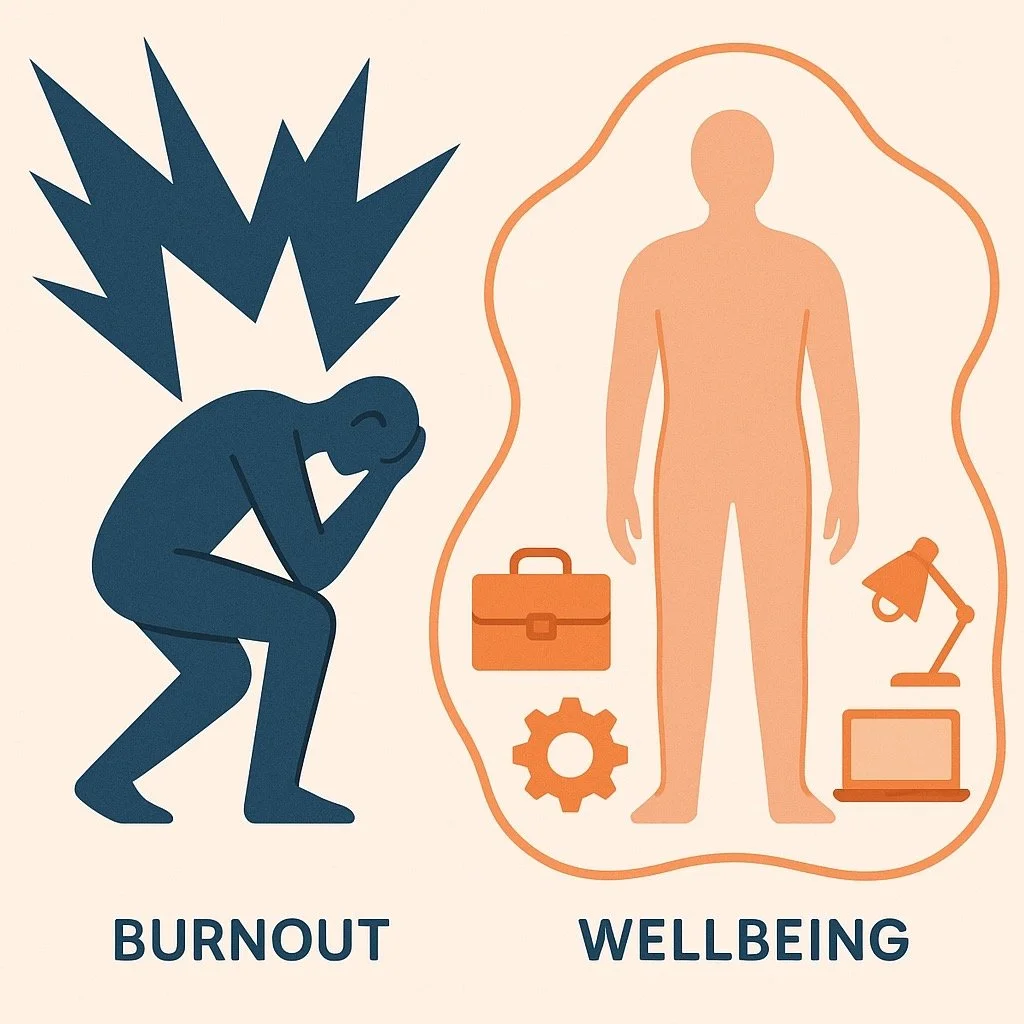How Modern Team Training Boosts Employee Wellbeing and Retention
In today's fast-paced workplace, companies are discovering that their greatest assets aren't fancy tech tools or cutting-edge systems—they're the people who show up every day. But here's the challenge: keeping those valuable team members engaged, healthy, and committed to sticking around.
The solution? It's not about throwing more money at the problem or installing ping pong tables. The real game-changer is modern team training that addresses both professional development and personal wellbeing.
The Hidden Connection Between Training and Wellbeing
Traditional workplace training used to mean boring compliance videos or technical skill updates. Today's approach is radically different. Modern team training recognizes that employees aren't just productivity machines—they're whole humans with complex needs.
"When we invest in comprehensive training, we're telling employees 'we value you enough to invest in your growth,'" explains workplace psychologist Dr. Maya Henderson. "That sense of being valued is fundamental to wellbeing."
Recent studies back this up. Organizations implementing holistic training programs report:
43% reduction in workplace stress
37% increase in job satisfaction scores
28% improvement in team collaboration metrics
But what makes modern training different from the outdated approaches of yesterday?
The Evolution of Workplace Training
Then vs. Now
Traditional Training:
One-size-fits-all approach
Focused solely on technical skills
Delivered in lengthy, infrequent sessions
Success measured by completion rates
Modern Training:
Personalized learning pathways
Balanced focus on technical, soft, and wellbeing skills
Microlearning and continuous development
Success measured by behavior change and wellness outcomes
This shift represents a fundamental change in how we view the purpose of workplace learning. Rather than treating training as a box-ticking exercise, forward-thinking companies see it as an investment in creating resilient, adaptable, and thriving teams.
Five Ways Modern Training Directly Boosts Wellbeing
1. Stress Management and Resilience
Today's training programs typically include specific modules on managing workplace pressure, building personal resilience, and maintaining mental health. These aren't fluffy add-ons—they're essential skills for navigating modern work challenges.
When employees learn practical techniques for handling stress, they experience fewer burnout symptoms and report higher satisfaction levels. Training that includes mindfulness practices, boundary-setting skills, and cognitive reframing techniques gives team members concrete tools they can apply daily.
2. Communication and Conflict Resolution
Poor communication and unresolved conflicts are major sources of workplace stress. Modern training that focuses on effective communication, active listening, and constructive conflict resolution directly reduces this pressure.
"We've seen dramatic improvements in team dynamics when everyone shares a common language and framework for handling difficult conversations," notes Kim Taylor, a leadership development specialist. "People feel safer, more heard, and less anxious about potential conflicts."
3. Manager Effectiveness
One of the most significant wellbeing factors is the relationship between employees and their immediate managers. Modern training equips managers with the emotional intelligence and supportive leadership skills necessary to create psychologically safe environments.
When managers receive training in empathetic leadership, recognition techniques, and supporting team members through challenges, their direct reports show measurable improvements in workplace happiness and engagement.
4. Work-Life Integration
The line between work and personal life has blurred significantly, especially with remote and hybrid work models. Today's training addresses this reality by teaching practical skills for managing boundaries, prioritizing effectively, and avoiding digital overwhelm.
Employees who receive this training report feeling more in control of their time and experience less spillover stress between work and home life.
5. Purpose and Meaning
Modern training often includes elements that help employees connect their daily work to broader purpose and meaning. When people understand how their contributions matter, they experience greater fulfillment and motivation.
"Humans fundamentally need to feel their work matters," explains purpose coach Jamie Wilson. "Training that helps people identify their values and connect them to their work isn't just nice-to-have—it's essential for sustained wellbeing."
The Direct Impact on Retention
The link between wellbeing and retention isn't just theoretical—it's backed by solid data. Companies that prioritize comprehensive training see significant impacts:
Organizations with robust wellbeing programs experience 10% higher retention rates on average
Employees who receive regular skills development and internal mobility opportunities are 75% more likely to stay with their company
Teams whose managers receive advanced people leadership training show 31% lower turnover intention
Let's break down exactly how this works:
Engagement Through Growth
When employees continually develop new skills and see pathways for advancement, they remain engaged and forward-looking. This contrasts sharply with the stagnation that often precedes resignation.
At Chatterbox Workshops, we've observed that teams who participate in regular, meaningful training maintain significantly higher engagement scores—and engaged employees are far less likely to job-hunt.
Belonging Through Connection
Modern training approaches often incorporate collaborative elements that strengthen team bonds and foster a sense of belonging. This social connection is a powerful retention factor, especially in hybrid and remote environments where isolation can lead to disengagement.
Prevention of Burnout
By equipping employees with wellbeing skills and creating supportive environments, modern training directly addresses one of the primary drivers of turnover: burnout. When people have tools to manage their energy and workload effectively, they're less likely to reach breaking point.
Implementing Effective Training That Delivers Results
Creating training that genuinely improves wellbeing and retention requires a strategic approach. Here are key principles for success:
Integration with Real Work
The most effective training isn't separated from daily work—it's integrated into it. Look for programs that provide immediate application opportunities and real-world practice.
Leadership Modeling
When leaders actively participate in and apply training principles, the impact multiplies. Training should include specific guidance for managers on modeling healthy behaviors and supporting team implementation.
Consistent Reinforcement
One-off training events rarely create lasting change. Effective programs include regular reinforcement, peer support mechanisms, and ongoing learning opportunities.
Measurement and Adaptation
Track wellbeing metrics alongside retention data to understand what's working. The most successful organizations continuously refine their training approaches based on outcomes.
Real-World Success: The Compounding Effect
Companies implementing comprehensive training approaches see a compounding effect over time. Initial improvements in wellbeing metrics lead to enhanced collaboration, which drives innovation and performance, further strengthening retention.
Consider the experience of a mid-sized tech company that partnered with Chatterbox Workshops. After implementing a comprehensive training program focused on communication skills and wellbeing:
Employee satisfaction scores increased by 27%
Sick leave decreased by 19%
Voluntary turnover dropped by 24%
Team performance metrics improved by 31%
The financial return was substantial: for every dollar invested in training, they saw approximately $5.20 in combined savings from reduced turnover costs and productivity improvements.
The Bottom Line: Training as Strategic Investment
In a competitive talent landscape, modern team training isn't just a nice-to-have—it's a strategic necessity. Companies that invest wisely in developing both the professional capabilities and personal wellbeing of their teams gain a powerful advantage.
The most successful organizations are shifting from viewing training as a cost center to seeing it as a critical driver of both human and business outcomes. When training addresses the whole person—their skills, connections, purpose, and wellbeing—the result is a workforce that's not just more likely to stay, but more likely to thrive.
Ready to transform your team's wellbeing and retention through modern training approaches? Learn more about our tailored programs designed to create thriving, resilient teams that stick around for the long haul.




